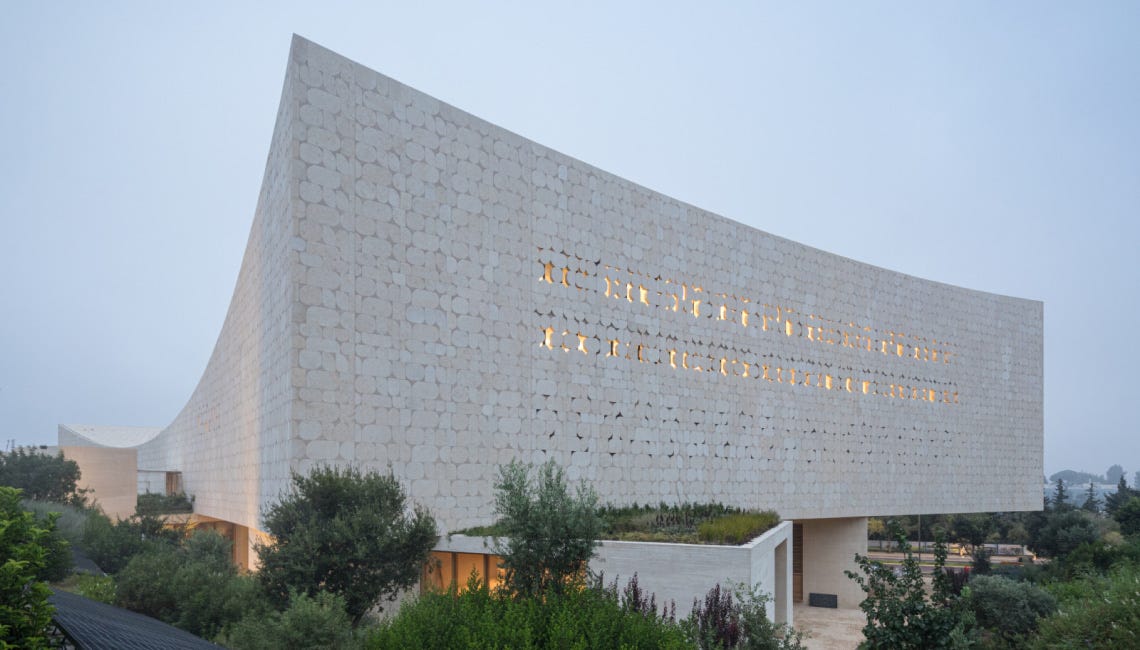People of the Book
The National Library of Israel is a national treasure. It's also visually stunning.
Book aficionados from across the country, as well as those visiting from abroad, have found a real gem in the new National Library building. The fresh $225 million building1 brings beauty, majesty, and intentionality over all of its design and artistic choices.
We are often taught how quality is far more important than quantity in life, but let’s take a shocking look at quantity.
How many books do you think are currently in the National Library? 100,000?
Holy Moses! That’s a lot of books, but you’re not even close.
500,000? You’re getting warmer, but the dud has only been on for 15 minutes and you’re not getting too hot anytime soon.
1,000,000? Now you’re talking. That’s some serious bookage!
But no, not quite.
I’ll just tell you at this point ———— 4.5 MILLION! Please excuse the shouting, but that is a ridiculous number of books. It is a blessing to have amassed such a gigantic collection.
This number is continuously growing thanks to a certain Israeli law. The Books Law, passed in 2000, mandates that authors must give two copies of any book that is published in Israel to the National Library. The rationale for the law is spelled out on the National Library’s website:
“The National Library is responsible for preserving the cultural assets of the State of Israel for future generations, as well as for researchers, scholars and citizens. ”2
How does one find a book in this labyrinth of literature? Some handy dandy robots run throughout the warehouse where a majority of the books are held. It’s truly a marvel to watch these bins go along the elaborate tracks of the warehouse and take books from any level. The process of moving the books through the years to new locations can be found here.
Aside from those going on guided hours or simply looking around and taking it all in, many serious researchers can be found in the reading room any day of the week. You can find Chassidic men in full garb sitting next to secular college students, each delving into their own texts. I was doing work on my computer in the room, but I could tell that others were doing some serious research. I thought to myself how interesting it would be to talk to the people sitting across from me. Are they professors? Scholars? What brings them to this outstanding room?
The Jewish people might be relatively small in number, but we are not small in the areas of reading and writing. The reality of spending so much money and effort to build and maintain this mammoth is a testament to how highly the Jewish people and the Israeli people value books.
In addition to this reading room, there is the Gershom Sholem Kabbalah reading room, which has a cave-like feel. The learners in this room seem more specific to Kabbalah while the main reading room has all kinds of people.
There are conferences and events held at the library. One major lecture hall hosts speakers. A bonus feature in the summer is a concert series just outside of the library. This summer featured Noga Erez, Marina Maximilian, Eviatar Banai, and Knesiyat Hasechel featuring Dudu Tassa. I thoroughly enjoyed Knesiyat Hasechel and Dudu Tassa. They sang beautifully together and it was just a fun time. Israeli journalist Amshel Pfeffer had this to say after the concert (Church of the Mind is the English translation of Knisiyat Hasechel, but they go by their Hebrew name even in English):
I couldn’t agree more, Anshel. (Thank you, Noah, for sharing this shortly after we left the concert.)
I thank my friend, Joseph Sueke, for a delightful and engaging tour of the National Library.
I would highly recommend a trip there whether to explore, to read, or to people watch.
Happy reading!
Song of the Week
שום דבר לא יפגע בי
Shoom du-vawr loe yeef-ga bee
Nothing will hurt me
On Wednesday, I went to the Knesiyat Hasechel and Dudu Tassa concert at the National Library and it was quite wonderful. The music was great, the people watching was solid, and the sharing of the experience with the Israeli people.
Slang of the Week
אמ;לק - ארוך מדי לא קראתי
Awm-lawk - uh-roech mee-die loe ka-ra-tee
Tl;dr - too long; didn’t read
A summary given for long articles. It’s actually used while speaking in Hebrew in a way of not getting into something too deeply.
Thank you kindly for reading this week’s post. I hope that you will continue to read and enjoy. I’d be grateful if you could tell one friend or family member to give it a try.
Thank you for your partnership as we learn and grow.
Wishing you a Shabbat shalom and a quiet and safe weekend!
Follow us on:
Website
Spotify
Steinberg, Jessica. “New National Library opens its doors to readers, semiofficially”. https://www.timesofisrael.com/new-national-library-opens-its-doors-to-readers-semiofficially/.
“Legal Deposit”. National Library of Israel. https://www.nli.org.il/en/at-your-service/who-we-are/depositing#:~:text=The%20National%20Library%20is%20responsible,of%20it%20to%20the%20Library.







This is very cool and I had never even heard of it! It looks gorgeous.